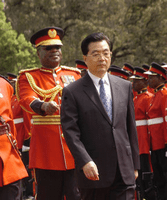Globalization's historical expansion from Europe to North America to Asia has featured a familiar dynamic: The last region "in" becomes the integrator of note for the next region "up." Europe was the primary investor, customer and integrator for the U.S. economy in its rise during the 19th and 20th centuries, and America subsequently "paid it forward" with East Asia in the decades following World War II. Recently, it has been Asia's turn, primarily through China, to pay it forward once again with Africa, arguably the hottest integration zone in the global economy today.
Nonetheless, in Washington -- and especially inside the Pentagon -- China's rising influence across Africa has been viewed with genuine trepidation. Beijing's "non-interference" mantra doesn't exactly jive with President Barack Obama's stern focus on counterterrorism, while China's rapacious hunger for raw materials fosters fears of strategic minerals being "cornered."
The most intriguing upside of China's presence in Africa concerns oil, where China continues to develop reserves that were not in play before, thereby adding new capacity to global markets and generating additional local income growth -- a win-win for all concerned. The big question coming up, however, is whether or not China can do the same in the all-important category of food production.

